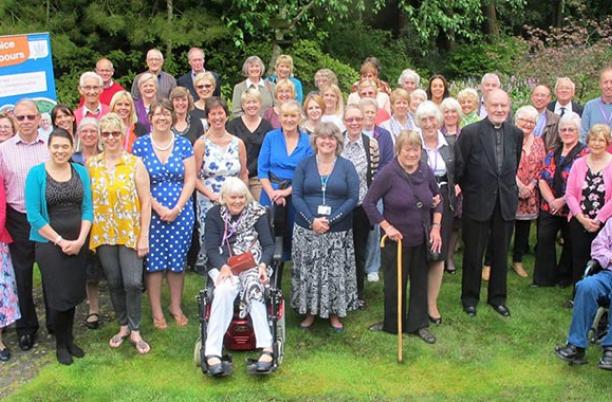
Hospice Neighbours

Neighbours is a Community Volunteering programme provided by St Nicholas Hospice to raise awareness of death and dying as a way of building community capacity at end of life.
How and why we began Hospice Neighbours
Inspired by Dr Suresh Kumar’s work in Kerala, Barbara Gale Chief Executive at St Nicholas Hospice Care developed ‘Hospice Neighbours’ in 2011 intending to be a community-based and volunteer-led project providing practical support and companionship to people and their families living with life-limiting conditions.
The project enables a health promotion perspective to raise awareness of death and dying as a way of building community capacity at end of life coupled with an organisational desire to co-create empathy alongside the wider community with a ‘non-traditional hospice volunteer’ approach.
Hospice Neighbours and the sheer resourcefulness held within the wider community primarily addresses and encourages the following areas that are interlinked with a reciprocal sense of wellbeing for both the volunteer and the individual.
Friendship
The friendship element of the project is hugely valuable in counteracting both the isolation and emotional distress that can arise from the challenge of living with life-limiting illnesses.
Practical help
The significance of practical help given to people not only helps relieve the burden of getting things done, but in some cases, it develops the confidence to do things themselves. Practical support has covered such diverse areas as volunteers helping with using technology to communicate with families, tidying a garden and mentoring young adults in readiness to take exams.
Short respite for carers
Providing much needed time for family members
'..She has made me feel that I am still alive ...I can visit the hairdresser and feel that I can still take part in life. Hospice Neighbour visits have provided me with a breather to recuperate from the demands of care..' Quote from family
Making connections and building networks
Making connections and helping to build support networks with everyday life helps realise and maintain a bridge with the wider community, and provides an element of normality that is extremely valuable to people.
'... I didn’t know what was going on outside ... the local paper only reports on incidents ... it doesn’t hold a conversation with you. I couldn’t even walk into town but she’d come with me, we’d go for a cup of tea. She helped me get back into my life ..'
Challenges – risk versus reward
Clinical staff and governing boards can find the philosophies and concepts behind Hospice Neighbours challenging. Professionally held fears and concerns, for example, the safety of a cared-for person, risk-management, confidentiality and boundaries take time to address.
Building relationships and authentic dialogue is important to address barriers and enable professionals to start to operate beyond clinical service delivery and into the area of working alongside community-based assets.
Concerns can be addressed through providing support, training, risk management, and guidelines on confidentiality to volunteer Hospice Neighbours. In turn, these offer reassurance within the organisation. Training is now increasingly light touch and more focused on boosting confidence, building trust and giving reassurance and permission to the participants.
Connecting and genuinely being alongside our communities will involve professionals ‘letting go’ to acknowledge, trust and appreciate existing and potential networks of support within a neighbourhood.
People live their lives in communities long before they engage with hospice services. We must take care not to disable this support around the person by telling them that we are the expert and risk distancing them from their community.
As people become familiar with this approach and observe its benefits, professional staff and others become more confident about involving themselves and recommending it to others.
We've found that having genuine engagement, encouragement and warmth makes communities ready and willing to be involved. In doing so, Hospice Neighbours helps extend the hospice’s reach to those people at the end of life who may not normally encounter hospice care.
Importantly, we see hospice care as a behaviour and not a building.
